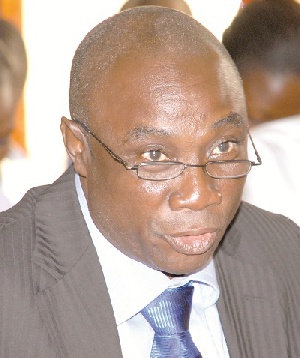- Home - News
- TWI News | TV
- Polls
- Year In Review
- News Archive
- Crime & Punishment
- Politics
- Regional
- Editorial
- Health
- Ghanaians Abroad
- Tabloid
- Africa
- Religion
- Election 2020
- Coronavirus
- News Videos | TV
- Photo Archives
- News Headlines
- Press Release
Business News of Tuesday, 15 December 2015
Source: B&FT
Gov’t debt to ECG is overblown – Power Minister
The Power Minister, Dr. Kwabena Donkor, has launched a strong denial of claims that the government’s debt to Electricity Company of Ghana (ECG) is hurting operations of the company and energy generation in the country, tagging it as a “misconception”.
Dr. Donkor in an interview with the B&FT on Friday, which was broadcast live on the B&FT twitter account -- #AskBFT -- said criticism that the outstanding debt to ECG has affected investments in energy generation and distribution, and has also caused the Public Utilities and Regulatory Commission to hike tariffs, is misplaced since the energy utility companies have also failed to honour their financial obligations to government.
“There is this question of overblown government arrears, and I am happy for the opportunity to address this situation.
“Technically, government does not owe because government is servicing ECG, VRA and GRIDCo debts; and t if we do the offset, which we must do in accounting, we will realise that the owing is the other way round. That is why I don’t make much noise about government’s debt, because I know the reality.
“For instance, government issued a promissory note for the VRA to buy crude oil to power its thermal plants. VRA has been unable to pay for that crude oil, even though it has used that crude for which the government is paying.
“The number of loans contracted to either build or expand capacity and the utilities are not servicing, government is doing that|: if we were to do an offset, ECG would owe government. The government is paying far more than it owes ECG and VRA. So it is a misconception. If we push government to the wall, we will realise that unfortunately ECG, VRA, etc. owe government rather than the other way round,” he explained.
Due to government’s inability to pay for power consumed the ECG, which is the interface between power generators and consumers as it is the sole distributor of power in the country, is highly indebted to GRIDCo -- the country’s only power transmission operator -- which also owes VRA, the main power generator, and other independent power producers.
As of now, the current debt that government owes the ECG as a result of power consumed by ministries, department and agencies (MDAs) as well as other state institutions is not available; but anecdotal evidence, as provided by workers of ECG, VRA and GRIDCo in a joint statement issued in January this year, suggest that the state owes the power distribution company in excess of GH¢1.2billion, which constitutes about 62 percent of the total debt owed the ECG.
The quantum of outstanding arrears to the ECG is reported to have resulted in underinvestment for energy distribution facilities, aggravating the challenge of system losses -- currently at around 25%.
According to the ECG, it will require a sustained investment of about US$200million every year to address its investment gap in order to meet annual power demand growth rate of about 12 percent.
Last week, the PURC announced a 59.2 percent increased in electricity tariffs to help the power companies meet the cost of producing and distributing power, which is largely unavailable in the country due to deficiencies in energy supply.
However, following the announcement of hikes in power usage charges which took effect on Monday, many consumers have been aghast at the utilities regulator’s decision -- with the Trade Union Congress and opposition political parties including the main NPP and CPP arguing that there would not have been any need to saddle Ghanaians with increased tariffs if government had paid its debts to the energy utility companies.
Dr. Donkor said despite government’s commitment to help the energy utility companies meet their investment needs, the state is dedicated to settling its debt to the ECG -- which is one of the conditions for the concessionary arrangement with the United States Millennium Challenge Compact with Ghana for the injection of close to US$500million into Ghana’s energy sector, including ceding the management and operations of ECG to a private enterprise.
“As at the end of 2014, for what has been audited as MDAs debts, an arrangement is in place and government is honouring that. Every quarter, government is paying GH¢36million to clear the debts.
“But to maintain our power infrastructure, the power companies need to constantly invest when they have a strong balance sheet. They must invest their surplus; that is why government has over the years has had to come in and inject investments into the sector, and then government pays the debt. Yet you will find people going saying government owes the energy companies without taking into account the investments that government is servicing on behalf of the utilities,” he added.











